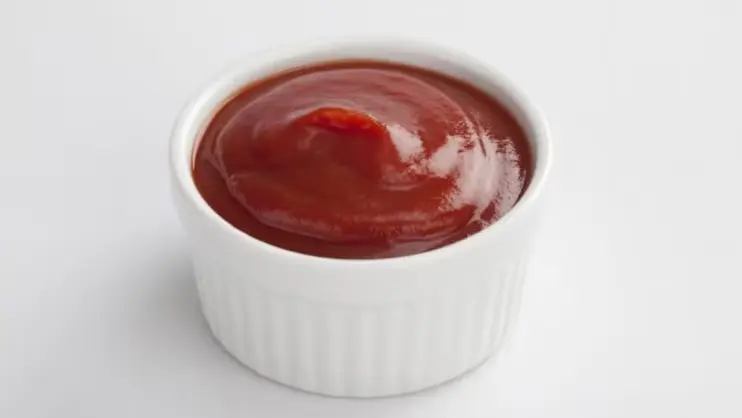Can Dogs Eat Ketchup? The Truth About This Popular Condiment
As a pet owner when it comes to certain human foods, it’s important to tread carefully. One such food that often raises questions is ketchup. Many dog owners wonder, “Can a dog eat ketchup?” This article will explore the safety, potential risks, and considerations of feeding ketchup to dogs.

Understanding Ketchup: What Is It Made Of?
Ketchup is a popular condiment made primarily from tomatoes, sugar, vinegar, and various seasonings. While tomatoes are a common ingredient in many dog diets, the other components of ketchup can be problematic for dogs. Let’s break down the ingredients:
Tomatoes
Tomatoes are generally safe for dogs in moderation, especially when they are ripe. However, unripe tomatoes and the green parts of the plant contain solanine, which can be toxic to dogs in large amounts. Most commercial ketchup uses ripe tomatoes, so this aspect is usually not a concern.
Sugar
One of the main ingredients in ketchup is sugar. Dogs do not require added sugars in their diet. Excessive sugar consumption can lead to a variety of health issues, including obesity, dental problems, and diabetes. Ketchup often contains a significant amount of sugar, which is why it’s not recommended for canine consumption.
Vinegar
Vinegar is another key ingredient in ketchup. While small amounts of vinegar are generally safe for dogs, excessive consumption can upset their stomach and lead to digestive issues. It’s not a necessary part of a dog’s diet, and it’s better to avoid feeding them ketchup for this reason.
Seasonings
Ketchup can also contain various seasonings and additives, including onion powder and garlic powder. Both of these ingredients are toxic to dogs, even in small amounts. They can cause gastrointestinal upset and, in severe cases, lead to more serious health problems.
Is Ketchup Safe for Dogs?
Considering the ingredients, ketchup is not considered a safe or healthy option for dogs. While a small amount of ketchup is unlikely to cause serious harm, the potential risks outweigh any benefits. The sugar content, presence of potentially harmful seasonings, and unnecessary calories make ketchup a poor choice for canine diets.
Potential Risks of Feeding Ketchup to Dogs
- High Sugar Content: The high sugar content in ketchup can lead to obesity and related health issues in dogs. It’s essential to monitor your dog’s weight and maintain a healthy diet.
- Digestive Upset: The combination of sugar, vinegar, and seasonings can upset your dog’s stomach, leading to vomiting or diarrhea.
- Toxic Ingredients: Ketchup can contain ingredients that are harmful to dogs, such as onion or garlic. Even if the amounts are small, it’s best to avoid any potential risks.
- Unnecessary Calories: Ketchup adds empty calories to your dog’s diet without providing any nutritional benefits. It’s important to prioritize healthy, balanced meals for your furry friend.
What Should You Do If Your Dog Eats Ketchup?
If your dog manages to sneak a lick of ketchup, there’s no need to panic. A small amount is unlikely to cause harm. However, keep an eye on your dog for any signs of gastrointestinal distress, such as vomiting or diarrhea. If you notice any concerning symptoms or if your dog consumed a large amount, it’s best to contact your veterinarian for advice.
Healthy Alternatives to Ketchup for Dogs
If you’re looking to enhance your dog’s meals, there are many healthy alternatives to ketchup that can add flavor and nutrition without the risks associated with ketchup:
- Plain Cooked Pumpkin: Pumpkin is rich in fiber and can help with digestion. It has a mild flavor that many dogs enjoy.
- Sweet Potatoes: Cooked and mashed sweet potatoes are nutritious and offer a naturally sweet flavor that dogs often love.
- Peanut Butter: Look for unsweetened peanut butter without added sugar or salt. Most dogs adore peanut butter, and it can be a great treat or food topper.
- Plain Yogurt: Unsweetened and unflavored yogurt can be a good source of probiotics. It’s a healthy way to add creaminess to your dog’s meals.
- Homemade Dog Gravy: You can create a simple dog-friendly gravy using low-sodium chicken or beef broth. Just ensure it doesn’t contain any harmful ingredients like onion or garlic.
Training Treats and Flavor Boosters
If you want to reward your dog or make their meals more exciting, consider using healthy training treats or flavor boosters. Many dog treats are available that offer various flavors and health benefits. Look for options that are low in calories and made with natural ingredients.
Conclusion: Can a Dog Eat Ketchup?
In conclusion, while a small taste of ketchup is unlikely to harm your dog, it’s best to avoid feeding it to them altogether. The high sugar content, potential toxic ingredients, and unnecessary calories make ketchup an unsuitable option for dogs. Instead, focus on providing your dog with a balanced diet rich in whole foods that are specifically safe for canine consumption.
If you ever have questions about your dog’s diet or want to explore safe food options, consult your veterinarian for personalized advice. By prioritizing your dog’s health and well-being, you can ensure they live a happy and fulfilling life, free from unnecessary risks associated with foods like ketchup.
